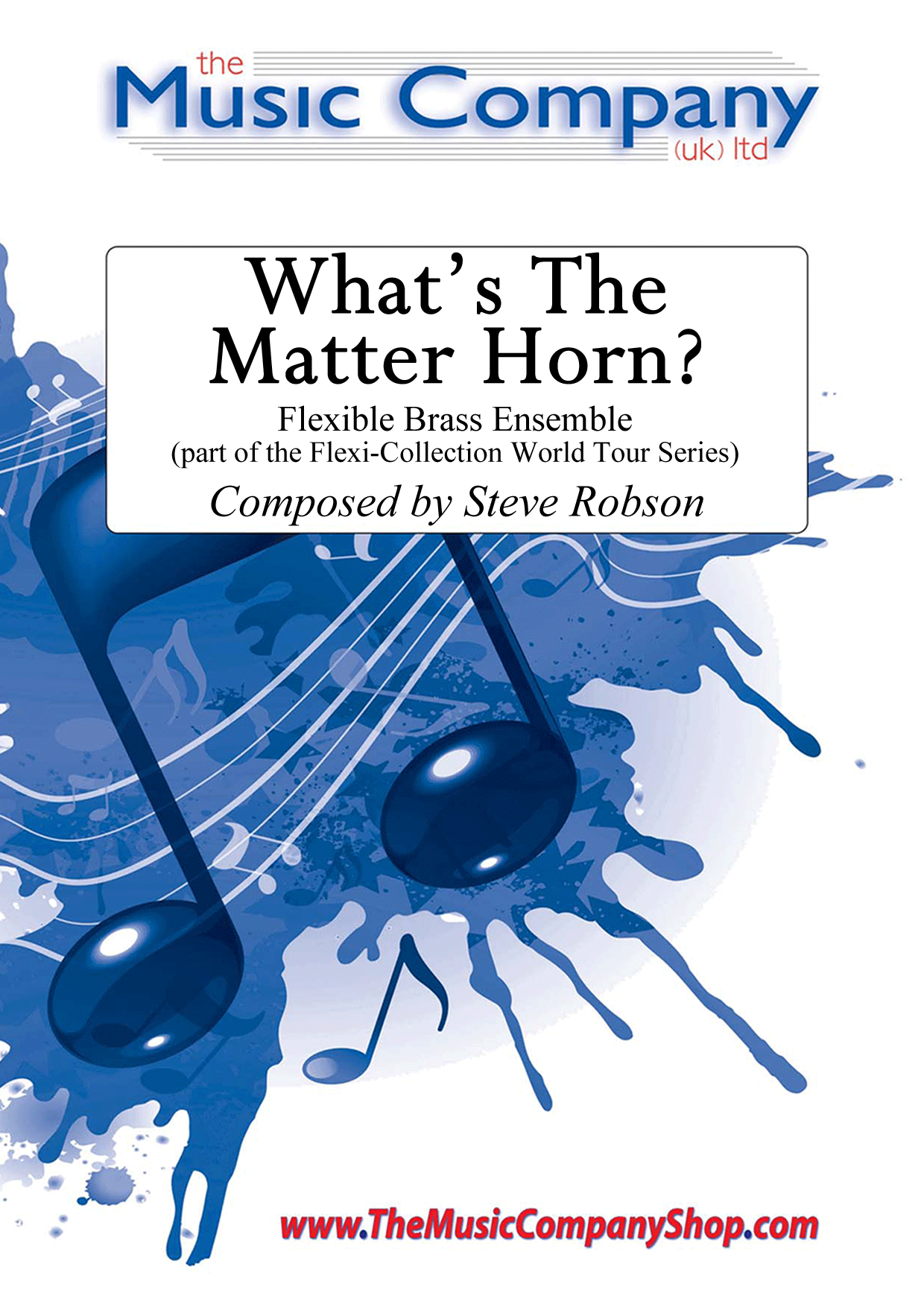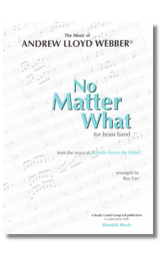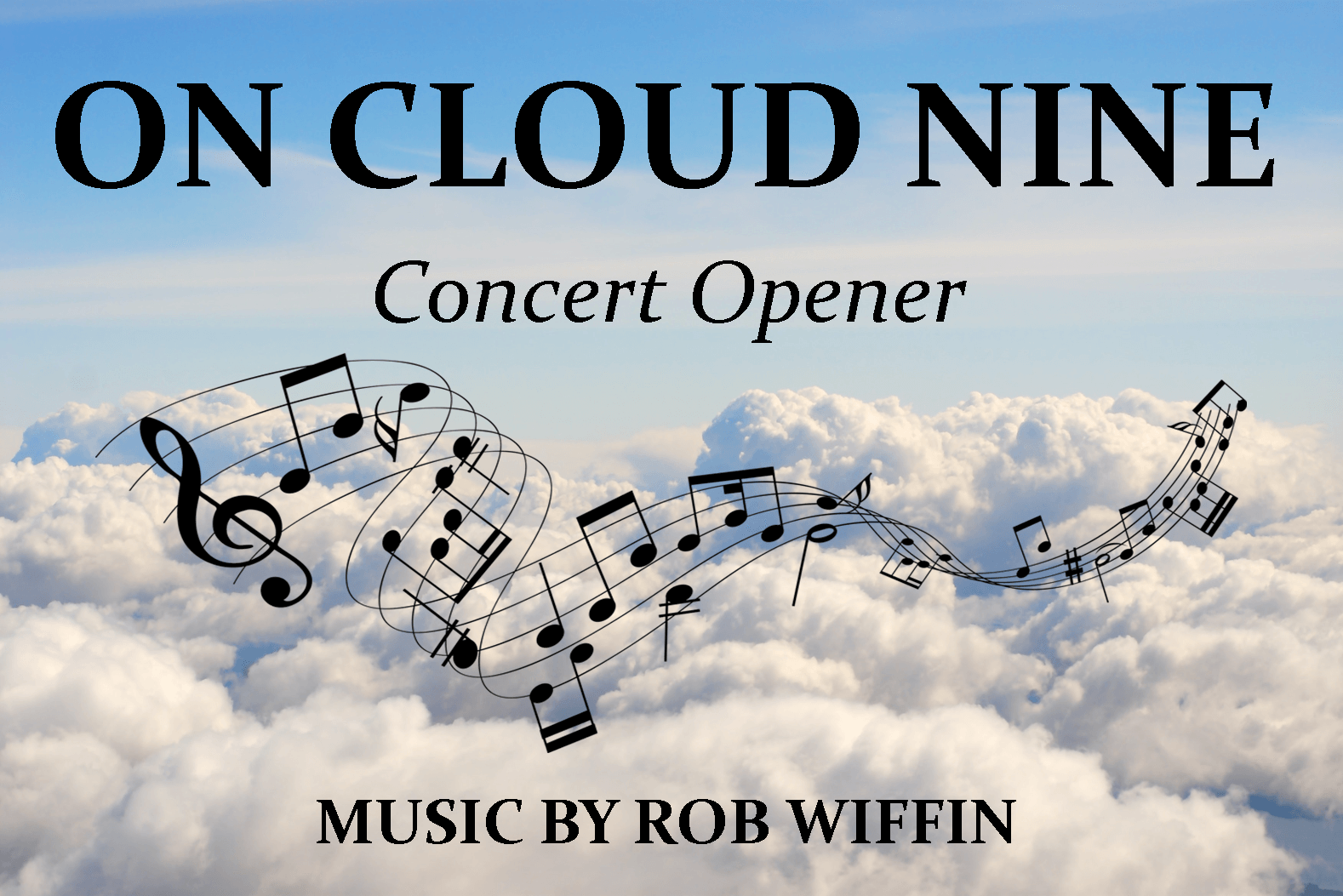Results
-
 £20.00
£20.00What's The Matter Horn? - Steve Robson
Composed by Steve Robson and scored specifically for our Flexi-Collection World Tour Series. Steve has been inspired by fond memories of hearing Alpine Bands and seeing knee slapping dancers performing in Switzerland for this piece. It starts with some off-stage calls (which could even be from an Alpine Horn if one is available), and moves into a lively dance section, ending with a little yodeling! There are various ways to convey the yodeling through instruments, but a bit of vocal yodel practice could be a novel new addition to the band's warm-up routine!Our Flexi-Collection Series:Flexible scoring tailored to your needs - a perfect solution for expanding the repertoire of Junior/Youth brass bands and ensembles. The Flexi-Collection currently offers two series and these will be regularly expanded to offer groups an even wider variation of music. Based on four-part harmony, these collections provide brass groups with the advantage of complete flexibility when may not be balanced.Added Extras:Each part of The World Tour Series also includes rudimentary theory reference sheet andLearn Together Moments(warm-up passages which relate to each of the styles of pieces included in the whole series). The score also includes background/programme notes andCheck It Outideas to encourage the players to find out more about the music style and/or inspiration behind the piece.If players or instruments are missing, the show can still go on! The thoughtful scoring and arranging by Steve Robson now means that groups of all abilities have access to a truly flexible set of music for their needs.Available for Brass Band (with world parts included), pieces included in our World Tour Series offer flexibility in every sense of the word.(Available individually or as part of the completeFlexi-Collection World Tour Series Album).
In Stock: Estimated dispatch 3-5 working days
-
 £39.95
£39.95No Matter What (Score and Parts) - Andrew Lloyd Webber arr. Ray Farr
The biggest hit song from the Lloyd Webber/Jim Steinman musical Whistle Down The Wind which was reset in the American south. A massive success for the boy band Boyzone and popular everywhere, the music transfers to the brass band sonority with ease. Ideal for summer concerts.
Estimated dispatch 7-9 working days
-
 £29.50
£29.50On Cloud Nine - Rob Wiffin
On Cloud Nine is a wonderful new concert opener; a vivacious four-minute concert item full of energy and good humour. It begins with a majestic fanfare-like statement. This opening melodic idea re-appears in various forms throughout the piece. The following themes are sometimes a little quirky with fantastic band parts for all players to enjoy. The piece is meant to convey a deep sense of joy which bubbles relentlessly to the surface no matter what else threatens to dampen it. The music is overwhelmingly optimistic in spirit and fun to play as well as listen to.
In Stock: Estimated dispatch 1-3 working days
-
 £75.00
£75.00As Above, So Below - Jay Capperauld
An original composition for brass band and brass quintet by Jay Capperauld was commissioned by John Wallace and The Wallace Collection with the support of the PRS Foundation's Beyond Borders. This major work enjoyed its world premiere at The Cumnock Tryst on 30 September 2017 at Cumnock Old Church, performed by The Wallace Collection and Dalmellington Band, conducted by Martyn Brabbins.If you would like to perform this work, please don't hesitate considering The Wallace Collection to provide the brass quintet elements - if you would like to discuss potential performances, please contact us on [email protected] NotesBased on the Hermetic maxim "As Above, So Below", the phrase comes from the cryptic text of The Emerald Tablet, which was purportedly written by a mysterious character who is thought of as an amalgamation of Greek and Egyptian Gods, Hermes Trismegistus. The text first appears in Arabic between the 6th and 8th Centuries and is intended to outline the primitive and hidden sources that constitute the basis of all matter in the universe. The phrase "As Above, So Below" implies an essential "oneness" of all matter and a correlation between the physical elements and supernatural entities that make up our surroundings. The philosophies expressed within The Emerald Tablet have become a founding principle of Alchemy, Occultism, Witchcraft, Theosophy and various other ancient gnostic systems of belief, and this work attempts to explore these forms of so-called "secret knowledge" in a ritualistic trance-like Adagio steeped in the esoteric.The Brass Band is placed at the centre of the stage while the solo Brass Quintet are spread antiphonally around the concert hall and are placed above both the Brass Band and the audience in an attempt to create a direct dialogue between the Above and the Below. Therefore, the piece endeavours to explore the meaning behind the text of The Emerald Tablet as well as the phrase 'As Above, So Below' in a music context while giving particular attention to the 'SOLVE' (Latin for 'Separate' which correlates to the Above) and 'COAGLUA' (Latin for 'Join Together' which relates to the Below) that is depicted in the image of the Baphomet by the French occultist author, Eliphas Levi, which is a visual representation of the phrase 'As Above, So Below'.Additional Note of InterestIt was not until the work was complete that the role of the main melody became clear when an unexpected and inadvertent correlation between this melody and that of the Latin Dies Irae presented itself. The plainchant nature of As Above, So Below's melody became a defining feature of the piece and when compared to the melody of the Dies Irae (a similar melody reminiscent of that contained within As Above, So Below), some interesting and unsettling implications unveiled themselves.The findings of a comparison can be interpreted as follows:Both melodies adhere naturally to the plainchant idiom, which in itself strongly relates to a supernatural (or quasi-religious) element in both cases.Both melodies originate in the key of D; the Dies Irae resides in the Dorian Mode on D while the As Above, So Below melody inhabits the D Octatonic Scale.Both melodies can be divided into three distinct phrases, although the melody to As Above, So Below can be divided into three phrases in a number of ambiguous ways.The most striking and unnerving connection is that, by pure chance, the Latin text to the Dies Irae fits perfectly under both melodies giving an entirely specific context to how the melodies are perceived.By understanding the As Above, So Below melody as an alternative to that of the Dies Irae and by interpreting it in the same context, the connotations of the Dies Irae's otherworldliness, and the suggestion of a dialogue with the supernatural and death adds a richer dimension to the As Above, So Below melody which in turn solidifies the esoteric concept of this work.In conclusion, this unanticipated and purely accidental relationship between both melodies is worthy of note more so from an emotional and contextual perspective rather than from any analytical evaluation concerning the music itself - it is the circumstance of the so-called "secret knowledge" that has presented itself within the inner workings of As Above, So Below.
In Stock: Estimated dispatch 3-5 working days
-
 £42.94
£42.94Verklarte Nacht (Brass Band) Arnold Schoenberg arr. Rob Bushnell
Composed in just three weeks in 1899, Verklarte Nacht (Transfigured Night) is a string sextet in one movement by Arnold Schoenberg. Whilst known better for tone rows, his dodecaphonic music and the Second Viennese School, Schoenberg was a master of harmony (writing a number of books on the subject) and, in his early life, was inspired by the music of Brahms and Wagner. This is his best-known tonal work. Its description as a tone poem is not surprising given it takes its inspiration from Richard Dehmel's poem of the same name, as well as Schoenberg's strong feelings towards his future wife, Mathilde Zemlinsky, sister of his teacher, Alexander von Zemlinsky. The work is said to have five sections, one for each of the stanzas in the poem. The poem, from 1896, describes a man and woman walking through a dark forest on a moonlit night. The woman shares a secret with him, that she is pregnant but not with his child. The man reflects upon this before warmly accepting (and forgiving) the news. The work premiered on 18 March 1902 in the Vienna Musikverein by the Rose Quartet. As was normal at the time, Schoenberg produced a string orchestra version that was premiered on 29 November 1916 in Prague, conducted by Zemlinsky, which was later revised in 1943 to better support the soloists, also adding more articulation and tempo markings. Whilst the piece was controversial at the time, both musically and due to the poem's "inappropriate" subject matter, Richard Dehmel himself was impressed, writing "I had intended to follow the motives of my text in your composition, but soon forgot to do so, I was so enthralled by the music." This arrangement is for the British-style brass band, with alternative parts for horns in F and bass-clef lower brass. To view a recording of the original composition please visit www.youtube.com/watch?v=vqODySSxYpc. Difficulty Level: 2nd Section + Duration: approx. 6.40 minutes Sheet music available from www.brassband.co.uk Instrumentation: Soprano Cornet Eb Solo Cornet Bb Repiano Cornet Bb 2nd Cornet Bb 3rd Cornet Bb Flugel Horn Bb Solo Horn Eb 1st Horn Eb 2nd Horn Eb 1st Baritone Bb 2nd Baritone Bb 1st Trombone Bb 2nd Trombone Bb Bass Trombone Euphonium Bb Bass Eb Bass BbTimpani Percussion 1-3
In Stock: Estimated dispatch 1-3 working days
-
 £78.09
£78.09Blaenwern Diversions (Brass Band) Karl Whelan
Commissioned by Micah Dominic Parsons, Blaenwern Diversions is based on the well loved hymn, Love Divine. The composer writes: 'Originally intended to be a set of variations, I found myself wandering around the notes of the hymn tune at the piano and found that the variations almost took on a life of their own resulting in what we have here - diversions. There are 8 diversions in total; the introductory diversion; diversions 1 - 6; and the finale which are divided into three linked movements. Blaenwern Diversions represents my entry into the world of contest works, so even though the piece aims to test the band, it is important that the band enjoy the music within no matter how treacherous!' To view a follow-the-score video please visit www.youtube.com/watch?v=6X5gTMTHkfg PDF download includes score and parts. Sheet music available from: UK - www.brassband.co.uk USA - www.solidbrassmusic.com Difficulty Level: Championship Instrumentation: Soprano Cornet Eb Solo Cornet Bb Repiano Cornet Bb 2nd Cornet Bb 3rd Cornet Bb Flugel Horn Bb Solo Horn Eb 1st Horn Eb 2nd Horn Eb 1st Baritone Bb 2nd Baritone Bb 1st Trombone Bb 2nd Trombone Bb Bass Trombone Euphonium Bb Bass Eb Bass Bb Timpani Percussion 1-3
In Stock: Estimated dispatch 1-3 working days
-
 £34.95
£34.95Aristotle's Air - Christopher Bond
The Ancient Greeks believed that there were four elements that everything was made up of: earth, water, air and fire. This theory was suggested around 450 BC, and was later supported and added to by Aristotle. The idea that these four elements - earth, water, air and fire - made up all matter was the cornerstone of philosophy, science, and medicine for two thousand years. Air was considered a 'pure' element, but in fact the air that's all around us is made up of a variety of gasses. Of course, in music, air has a different meaning; a beautiful song-like melody or tune and Aristotle's Air is just that. The work was commissioned by and written for The Cory Band as part of their winning 2015 Brass in Concert programme 'The Four Elements of the Universe', being premiered at the contest at The Sage, Gateshead, on 15th November 2015. The work was awarded the Cyril Beere Memorial Trophy for the Best New Composition or Arrangement.
Estimated dispatch 5-10 working days
-
£70.00
Origins - Peter Meechan
Origins is in three movements, with each movement having a different subject matter, all linked by the idea of origins: the first movement refers to musical origins; the second to the origins of life; and the final movement to the space exploration - the research of all origins. The first movement is based on a short motif, heard in the first three notes the soloist plays. These three notes cover the interval of a minor third (an interval that often plays a crucial role in my music) on which the whole concerto is built. The soloist and accompaniment interplay freely throughout the opening section, before an ostinato accompaniment appears - over which the soloist sounds a long legato melody. A short cadenza follows and a return to the opening material leads the movement to an end. The second movement, titled Harryas Song, is - as tradition dictates - a slow movement. Happy and reflective in nature, the main melody was written on the evening that my closest friend, Mark Bousie (a fine euphoniumist himself), and his wife Jayne, had their first child - Harry Bousie. It seemed only fitting that this song should be written for Harry in celebration. The final movement brings me back to a lifelong fascination with space, and in this particular movement, the Space Shuttle Discovery. Having completed 39 missions (including flying the Hubble telescope in to orbit), and spent a total of 365 days in space, SS Discovery made its final voyage in 2011 and was taken to the Smithsonian in Washington D.C. in April 2012. This final movement, titled Discovery, pays tribute to the great shuttle whose missions inspired millions across the generations. Origins was commissioned by Marco Schneider, Adrian Schneider and the Dunshan Symphonic Wind Orchestra, Beijing, China.
Estimated dispatch 12-14 working days
-
 £76.99
£76.99Bread and Games - William Vean
'Panem et Circenses', Bread and Games were essential for keeping the citizens of ancient Rome in check. While the bread was meant for the poorest among the Romans, the Games were Popular Pastime Number One for everybody.There were different kinds of games, such as chariot races (especially popular with female spectators), or wild-beast fights, where lions, tigers, bulls or bears were set on one another or even on human beings. Most popular, however, were the Gladiator fights. In 'Bread and Games' William Vean depicts one of the many fights in the antique Colosseum. 1. Entrance of the Gladiators: By powerful bugle-calls the attention of the peoplewas asked for, after which the Gladiators entered the Arena at the sound of heroic marching-music.2.Swordfight: We can hear that the fights were not mere child's play in this part.On the contrary, they were a matter of life and death and were fought accordingly.3.Mercy of the Emperor: Sometimes a wounded gladiator could be fortunate, depending on the mercy of the audience. Waving one's handkerchief meant mercy, a turned-down thumb meant no pardon. The Emperor had the right to take the final decision, but he usually complied with the wish of the majority of the public. 4.Lap of Honour: Gladiators were mainly selected among slaves, convicted criminals, or prisoners of war. Consequently, winning was very important, as it would mean fame, honour and sometimes even wealth. A lap of honour, therefore, was the winner's due reward.
Estimated dispatch 5-14 working days
-
 £60.99
£60.99Only One Glimpse - Agathe Backer-Grøndahl
A gem from the Norwegian folk music. No difficult and complicated matter but music based on sounds and atmosphere. The melody is one of pure beauty and mystical characteristic of the tranquil scenery of Norway. Solo for 2 B-flat instruments. Een juweeltje uit de Noorse volksmuziek. Geen moeilijke, ingewikkelde materie maar muziek gebaseerd op klank en sfeer. De melodie is er een van pure schoonheid en karakteristiek voor het mystieke verstilde Noorse landschap. Solo voor 2 bes instrumenten.
Estimated dispatch 5-14 working days
